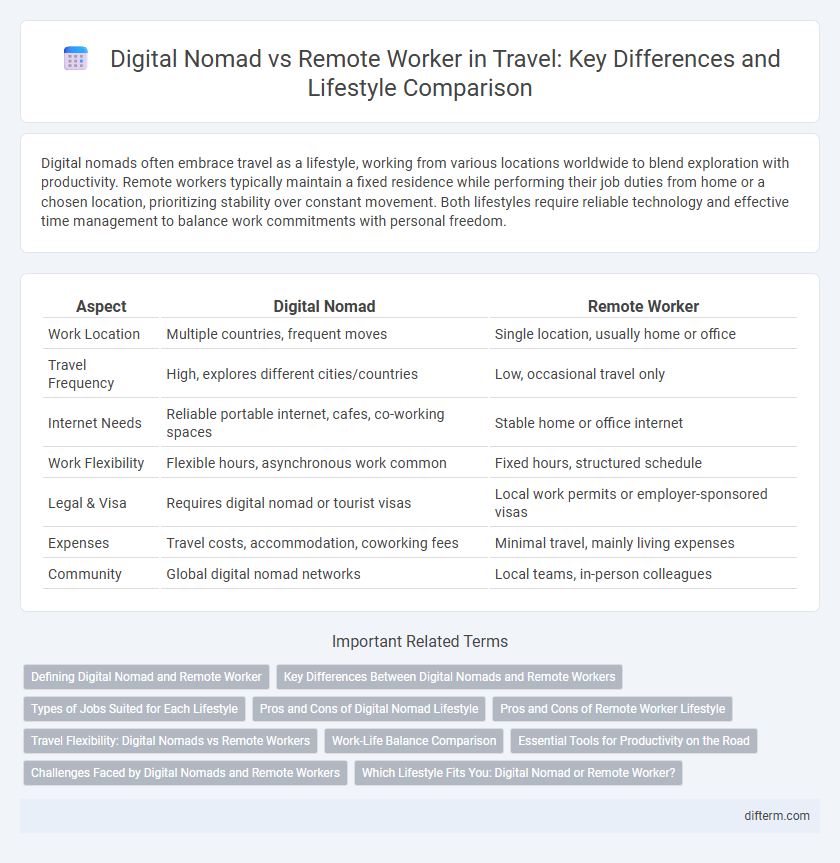Digital nomads often embrace travel as a lifestyle, working from various locations worldwide to blend exploration with productivity. Remote workers typically maintain a fixed residence while performing their job duties from home or a chosen location, prioritizing stability over constant movement. Both lifestyles require reliable technology and effective time management to balance work commitments with personal freedom.
Table of Comparison
| Aspect | Digital Nomad | Remote Worker |
|---|---|---|
| Work Location | Multiple countries, frequent moves | Single location, usually home or office |
| Travel Frequency | High, explores different cities/countries | Low, occasional travel only |
| Internet Needs | Reliable portable internet, cafes, co-working spaces | Stable home or office internet |
| Work Flexibility | Flexible hours, asynchronous work common | Fixed hours, structured schedule |
| Legal & Visa | Requires digital nomad or tourist visas | Local work permits or employer-sponsored visas |
| Expenses | Travel costs, accommodation, coworking fees | Minimal travel, mainly living expenses |
| Community | Global digital nomad networks | Local teams, in-person colleagues |
Defining Digital Nomad and Remote Worker
A digital nomad is a professional who leverages technology to work remotely while frequently changing locations, often traveling internationally and exploring diverse cultures. Remote workers typically maintain a fixed residence and work from home or a consistent location, relying on digital tools to fulfill their job duties without commuting to a traditional office. Both rely on internet connectivity and remote collaboration platforms but differ primarily in lifestyle mobility and geographic flexibility.
Key Differences Between Digital Nomads and Remote Workers
Digital nomads prioritize mobility, often working while traveling across multiple locations, while remote workers typically maintain a fixed home base despite working outside a traditional office. Digital nomads rely heavily on portable technology and flexible schedules to accommodate changing environments, contrasting with remote workers who usually follow structured routines within a consistent workspace. The distinction also extends to lifestyle choice, where digital nomads embrace travel as an integral part of their work-life balance, unlike remote workers who primarily seek the convenience of location independence without constant relocation.
Types of Jobs Suited for Each Lifestyle
Digital nomads thrive in jobs requiring creativity and flexibility, such as graphic design, content marketing, and software development, which allow for location independence and asynchronous workflows. Remote workers often excel in roles like customer support, project management, and data analysis, where structured schedules and real-time collaboration via video conferencing are essential. Understanding job requirements and communication preferences helps align career choices with the unique demands of digital nomadism or traditional remote work setups.
Pros and Cons of Digital Nomad Lifestyle
The digital nomad lifestyle offers unparalleled freedom to work from diverse global locations, fostering creativity and cultural immersion, but often lacks stability in reliable internet access and consistent work environments. Financial flexibility is enhanced through location-independent living, yet managing visas, taxes, and healthcare presents ongoing challenges. Social isolation and difficulty maintaining long-term relationships can impact mental well-being despite the excitement of constant travel.
Pros and Cons of Remote Worker Lifestyle
Remote workers enjoy the flexibility to stay in one location, fostering deeper community ties and consistent productivity with fewer distractions. However, they may face challenges such as limited cultural exposure and potential feelings of isolation compared to digital nomads who constantly change environments. This lifestyle suits those valuing stability and routine over the unpredictability and spontaneity of nomadic travel.
Travel Flexibility: Digital Nomads vs Remote Workers
Digital nomads enjoy unparalleled travel flexibility, often moving between countries and exploring diverse cultures while maintaining their work. Remote workers typically have a fixed home base, allowing less frequent travel and more structured routines. The ability of digital nomads to adapt quickly to new environments enables ongoing exploration and immersion in different destinations without sacrificing productivity.
Work-Life Balance Comparison
Digital nomads experience a dynamic work-life balance by blending travel with remote job responsibilities, often adapting their schedules to different time zones and cultural environments. Remote workers typically maintain a more structured routine, anchored to a fixed location, which can provide stability but limit spontaneous leisure opportunities. Both lifestyles require effective time management and boundary-setting to prevent work from encroaching on personal time, impacting overall well-being.
Essential Tools for Productivity on the Road
Essential tools for productivity on the road include cloud-based project management platforms like Asana and Trello, which help digital nomads and remote workers stay organized and collaborate efficiently. Reliable communication apps such as Slack and Zoom ensure seamless connectivity and real-time interaction regardless of location. Portable Wi-Fi hotspots and ergonomic travel gear further support consistent workflow and comfort during mobile work setups.
Challenges Faced by Digital Nomads and Remote Workers
Digital nomads and remote workers face unique challenges such as maintaining reliable internet connectivity across diverse locations and managing time zone differences that disrupt collaboration with global teams. Navigating visa restrictions and securing long-term accommodations adds complexity to digital nomads' itinerant lifestyles, while remote workers often struggle with creating productive home office environments. Both groups encounter difficulties in balancing work-life harmony and combating isolation due to their unconventional work setups.
Which Lifestyle Fits You: Digital Nomad or Remote Worker?
Choosing between a digital nomad and a remote worker lifestyle depends on your desire for mobility and stability; digital nomads embrace constant travel, leveraging coworking spaces and short-term stays across global cities like Bali or Lisbon. Remote workers prioritize stability, maintaining a fixed home base while working flexibly, often benefiting from consistent internet infrastructure and local community ties. Assessing your preference for cultural immersion, work environment consistency, and travel frequency is crucial to determining which lifestyle aligns best with your professional and personal goals.
digital nomad vs remote worker Infographic

 difterm.com
difterm.com